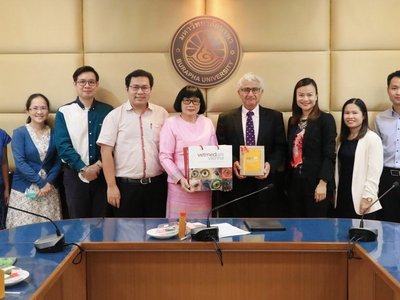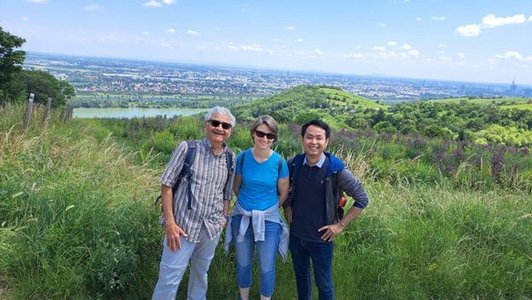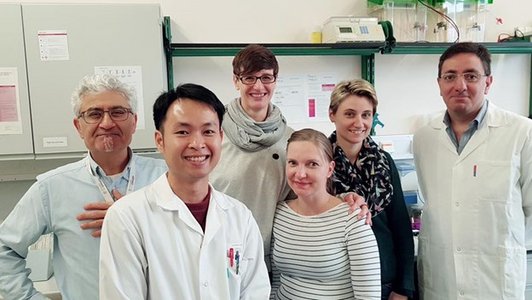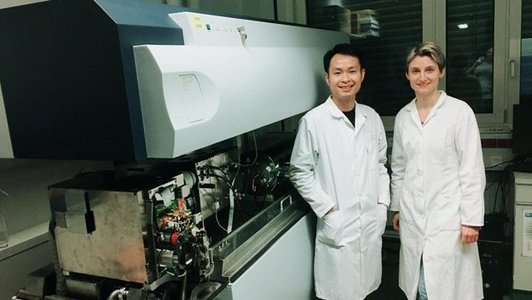

Preserving marine ecosystems - striving for regulations
I am one of the scholars who was awarded funding by the OeAD for an “ASEA-UNINET research project”, which has had a major influence on my research focus and current lies in the field of marine toxicology. Specifically, my research aims to elucidate the effect of specific contaminants on marine animals. I used oysters as a model for my research, as they have many advantages including a wild geographical distribution and are tolerant to a diverse range of environmental stressors. I found that it is very interesting to understand the actual impact of emerging pollution to the marine animal, which is typically underestimated.
To comprehensively assess the consequences of chemical exposure, I incorporated a range of multidisciplinary techniques, including histopathological and proteomic approaches. This integrated method allows for an in-depth exploration of the effects at cellular, tissue, and molecular levels, providing valuable insights into the true impact of these contaminants on the population of organisms.
Going forward, I would also like to extend our research to monitor long-term effects of marine contaminations to the animal with the goal of developing guidelines for routine assessment of animal health in the coastal water of Thailand and other countries. This information will be important in formulating regulations and management strategies for chemical usage and treatments in our region, contributing to the preservation of marine ecosystems.
Research at the University of Veterinary Medicine in Vienna
At the University of Veterinary Medicine, I was able to develop my proteomic analysis skill for protein research regarding marine environmental research. There are many outstanding activities impressed in my memory during my stay at VetCore at the University of Veterinary Medicine in Vienna. At first, it started from our research activity; we performed a proteomic analysis of oyster proteins which have been transported from Burapha University to VetCore. Later, we succeeded in explaining molecular mechanisms of a chemical (DDT) toxicity in oyster and obtained potential proteins to be used as a biomarker for DDT pollution in marine environments. As a result, we have published our research findings in one of the most outstanding scientific journals in the environmental field “Environmental Pollution”. It was my pleasure to work with professional and talented colleagues, especially at the Proteomic Platform of VetCore. The research atmosphere is great, as they are fully equipped with necessary tools and researcher expertise, and I was able to learn a lot from my colleagues.
Friendship at VetCore
Friends do matter – Friendship is not only for business but also for happiness. Besides my research story, the most impressive story I would like to share is about my friendships at VetCore. I realized that my colleagues here are not only talented and professional in their work but they are also incredibly friendly and kind. They are not only great colleagues to work with, but they are also great friends to spend time with. They always provide great support, and we would also spend time doing joint activities such as dining, hiking, sightseeing, badminton, etc. All these things made me feel very comfortable and happy to stay here with a great lab and great friends.
Successful cooperation: MoU between Burapha University and the University of Veterinary Medicine
I admit that our cooperation has had a great influence on my future research prospects. Since we succeeded in the first project regarding marine environmental research, we have been given many opportunities to continue our collaboration and extend the research network between Burapha University and the University of Veterinary Medicine. In 2022, we succeeded in establishing a Memorandum of Understanding (MoU) between Burapha University and the University of Veterinary Medicine. Currently, a few research projects have been already developed under this MoU and some of the students and researchers will be exchanged between the two universities. We do hope that, with this MOU, a number of research projects will be developed in our research community. This is important to improve the research quality and to develop the research capacity between students and researchers. This year we plan to exchange students and researchers between our two universities and two of our research projects will be supported by ASEA-Uninet 2023-2024.
I would like to express my gratitude to the OeAD for providing me the opportunity to set up a great research network.
CV:
Dr. Sutin Kingtong is Associate Professor at the Department of Biology, Faculty of Science at Burapha University in Thailand. He is mainly responsible for teaching and conducting research and his research interests include proteomics, marine environment, toxicology and oysters. His aim is to build research networks and maintain this network long-term to support the scientific community. He also aims to extend his collaboration network, develop research projects and partnerships and also do research exchange between Burapha University and the University of Veterinary Medicine.



